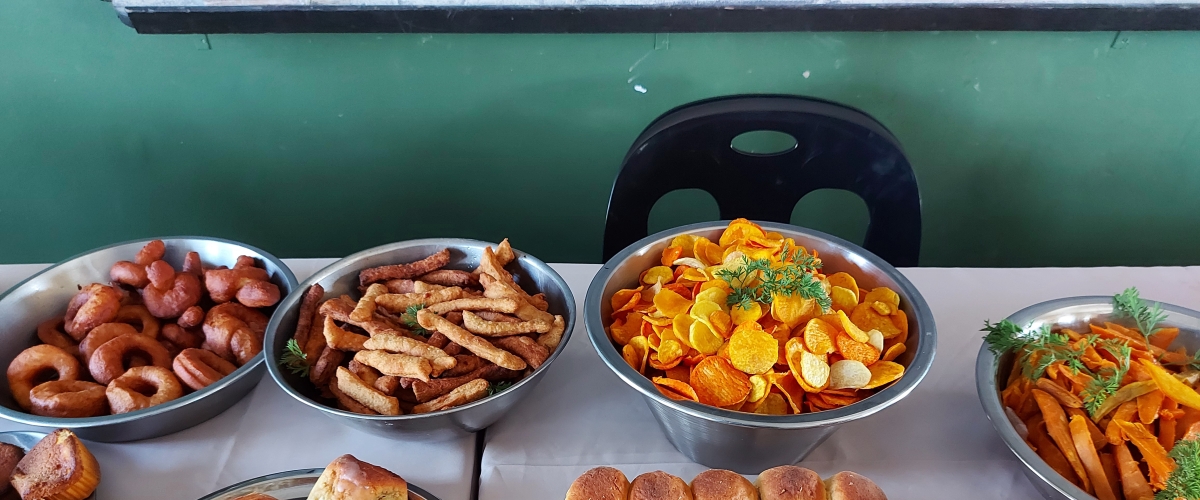
By Bongani Mvubu and Ncomiwe Maphalala
Food insecurity and malnutrition are significant challenges facing the Kingdom of Eswatini, primarily due to low agricultural productivity and limited diversity in crops and diets. The Government of Eswatini (GoE) is committed to prioritising food security and self-sufficiency through increased agricultural productivity per land area, crop diversification and commercialisation of smallholder agriculture, among other strategies. Sweet potato is one of the priority crops and an important food security crop.
Sweet potatoes contribute significantly to improving food and nutrition security mainly due to their resilience and adaptability to diverse soil types and climatic conditions. Drought spells are the most devastating phenomenon that hit hard in crop production in Eswatini since 70% of farmers are heavily reliant on rain-fed agriculture, resulting in a significant reduction in crop yield.
In addressing food and nutrition insecurity in Eswatini, the Department of Agricultural Research and Specialists Services (DARSS) under the Ministry of Agriculture, in collaboration with the Eswatini Water and Agricultural Development Enterprise (ESWADE) and the International Potato Center (CIP) in Mozambique, recently received financial support from the International Fund for Agricultural Development (IFAD), where they evaluated ten Orange Fleshed Sweet Potato (OFSP) varieties and developed food products. In general, sweet potato is an essential source of carbohydrates, vitamin C, fibres, iron, potassium, and protein. Orange fleshed varieties have the added advantage of being a rich source of ß- carotene, a precursor for vitamin A.
The Kingdom of Eswatini pre-dominantly produces white-fleshed sweet-potato varieties that unfortunately lack the much-needed vitamin A. Introduction of Vitamin A rich, orange-fleshed sweet-potato will reduce Vitamin A deficiency in Eswatini. In addition, the OFSP varieties are nutritious, tasty, delicious and provide a source of essential nutrients, particularly for people living with HIV. Besides the role of sweet potato as a food security and healthy crop, it is becoming an economic crop as it is mainly sold along roads, particularly in the informal market sector in Eswatini and surrounding countries such as Mozambique and South Africa.
Having received planting material for the ten OFSP varieties from the Republic of Mozambique, Eswatini conducted a study to identify locally adapted, high yielding, farmer preferred OFSP varieties among the introduced ones, then recommended them for official release and dissemination to farmers in Eswatini. Trials were planted at Malkerns Research Station (MRS), Lowveld Experimental Station (LES), and Nhlangano Experimental Farm (NEF), where the introduced OFSP from Mozambique were planted together with two local varieties as controls.
The evaluation was conducted over a period of two cropping seasons: 2019-2020 and 2020-2021. The first season was composed of only on-station trials in the three sites. In the second season, on-station trials were conducted alongside 36 on-farm trials, which were implemented using the Mother-Baby Trial approach in strategically selected sites around experimental stations and within Smallholder Market-Led Project (SMLP) target areas.
From the study, yields of some of the new OFSP varieties were up to 20 tons/ha, which were significantly higher than the two local varieties. These yields were obtained from the on-station trials over the two cropping seasons. Yields observed on the on-farm trials were lower than those recorded on-station for all the varieties evaluated. However, yields of up to 11 tons/ha, which is considerably higher than the average of less than 2 tons/ha that farmers currently obtain from the local varieties, were recorded for some of the newly introduced OFSP varieties under on-farm conditions. In terms of farmers’ taste preferences, the local variety Tainung 57 was most preferred. Farmers across the three sites equally preferred four new OFSP varieties (Namanga, Alisha, Cecelia and Melinda).
Based on the two-season data from both on-station and on-farm, seven of the ten introduced OFSP varieties, Sumaia, Namanga, Delvia, Cecelia, Alisha, Erica, and Melinda, performed better than the local varieties (Tainung 57 and Tainong 66) in terms of yield. Four OFSP varieties (Namanga, Alisha, Cecelia and Melinda) taste better and yield high than the local varieties hence recommended for release.
Based on the yield performance, farmers’ acceptability, in terms of taste by the farmers, and the fact that the OFSP varieties are rich in beta carotene and other micronutrients that can contribute to addressing the twin challenges of food insecurity and malnutrition in Eswatini, the varieties Namanga, Alisha, Cecelia and Melinda were recommended and were officially released for use by farmers.
The study was an eye-opener that can be conducted in other SADC member states to see whether similar results will be yielded.
Bongani Mbuvu is a Research Officer in the Department of Agricultural Research & Specialist Services in Eswatini. He is also the Information Communication & Knowledge Management Focal Point Person for the CCARDESA. Ncomiwe Maphalala is a Research Officer in the Departmnet of Agricultural Research & Specialist Services in Eswatini.






